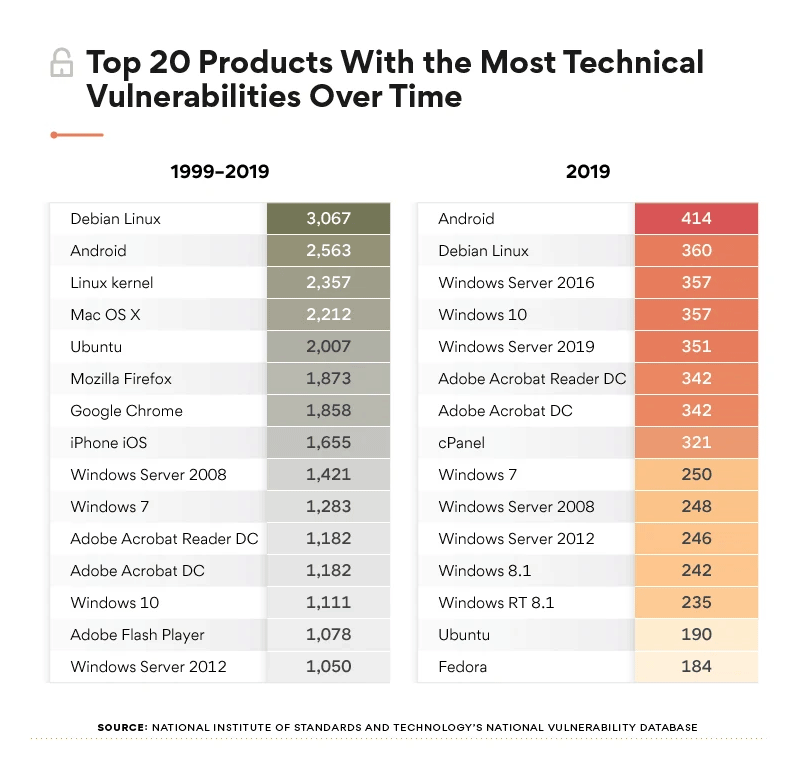
Both Linux and Windows are popular operating systems. With unique abilities, each has huge number of users and fans.
While it has long been suggested that Linux is a more formidable operating system and Windows as the most user-friendly, security experts however can tell them apart quite easy.
Linux has been known to be the most secure between the two, until The Best VPN reported otherwise.
The Best VPN that consists of "three passionate online privacy enthusiasts who decided to dedicate their free time testing different VPN providers," said that Linux and not Microsoft Windows, has had the most ‘technical vulnerabilities’ in popular pieces of the software between 1999 and 2019.
It is said that Debian, a flavor of Linux, was top of the table with 3,067 vulnerabilities over the last two decades.
This is reasonably worse than Android that has 2,563 vulnerabilities. The Linux kernel is at third place with 2,357, Apple’s macOS at fourth place with 2,212, and Ubuntu in fifth place with 2,007.
All of the top five places were taken by operating systems. At number six and seven, are Firefox and Chrome with 1,873 and 1,858 vulnerabilities respectively.
Coming to a surprise, Microsoft Windows 7 only had 1,283 vulnerabilities, and Windows 10 had 1,111.
Adding the vulnerabilities of just those two versions together, a total of 2,394 vulnerabilities were found in just about a decade - given that Windows 7 came out in 2009, before being replaced by Windows 10 in 2015.
However, it should be noted that some of the other numbers mentioned in the report comprise of a full two decades of existence. Like Debian for example, its 3,067 vulnerabilities were found since it's first inception in September 1993.
Then there are a number of other factors, such as the nature of those vulnerabilities, the likelihood of them being targeted by hackers, and the response of their respecting platforms to perform patches, and others.
What this means, it should be difficult to really make direct comparisons.
But still, the report shows that Microsoft Windows may not be as vulnerable as what people think it would be.

As for the seriousness of the flaws, the report uses the Common Vulnerability Scoring System (CVSS), which ranges from 0 to 10 as for its scoring.
Outlining the products with the vulnerabilities that posed the highest risks from 1999 to 2019, the top 50 products with the most vulnerabilities in the last 20 years, has Adobe Flash Player with the highest with a weighted average of 9.4. This implies that bugs found in the application were more likely to lead to a failure in confidentiality, integrity, and availability.
This is followed by Adobe Acrobat with 9.2, Microsoft Office with 9.1, Adobe Acrobat Reader with 8.9 and Internet Explorer with 8.6.
Of the 15 products listed, Apple watchOS and iTunes experienced the least-severe product vulnerabilities, scoring at the 7.0 range.
Others in the report include code execution as the most common type of vulnerability.
The method which allows an attacker to execute arbitrary commands, was responsible for more than 1 in 4 (25.3%) technical vulnerabilities in 2019, followed by cross-site scripting (17.7%). Code execution was also the most common type of vulnerability in 2018 and accounted for 3,041 security holes.
The vendor that is the most susceptible to attack is Microsoft. This is followed by Oracle, IBM, Google and Apple at fifth place.
To come into this conclusion, The Best VPN compiled an analysis from the CVE Details security database by the National Institute of Standards and Technology’s National Vulnerability Database.
"The data were available for every year from 1999 to 2019. Data for 2019 were pulled on Jan. 2, 2020, and included data for every month of that calendar year. Due to the fact that the database constantly updates, it’s possible that the numbers presented may have changed," said The Best VPN.
